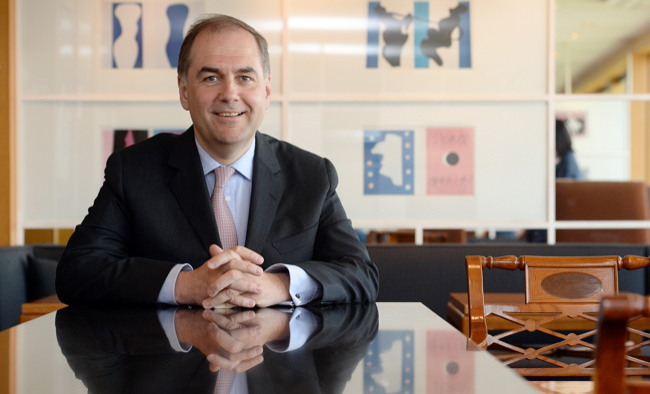Merck, the German pharmaceutical and chemical giant, is one of the oldest family-run companies in the world. Since starting as a small pharmacy in Darmstadt in 1668, the company has been controlled by the founding family.
“We do want to have some influence but don’t want to have all the influence. The key to our success is the family knows exactly what its responsibilities are and where to stop,” said Johannes Baillou, chairman of E. Merck KG, the holding company of the Merck Group, and a member of the 12th generation.
The 49-year-old chairman who took office last year visited Korea last week to celebrate the opening of the company’s new OLED application center in Pyeongtaek, Gyeonggi Province.
Amid keen interest in a leadership transition to a new generation at big business groups like Samsung, he unveils some secrets of Merck’s centuries-old successful family management.
 |
Johannes Baillou, chairman of E. Merck KG, speaks during an interview with The Korea Herald in Seoul. (Ahn Hoon/The Korea Herald) |
Family members of Korean conglomerates sometimes wield undue influence throughout group companies despite their small direct shareholdings.
Their social and economic privileges and the power games among them have often led to skepticism about family management itself.
In Germany, where almost 80 percent of the gross national product comes from family-run businesses, however, family business and corporate management are considered two different things.
Family members do not focus on short-term profits for outside investors. They make an investment decision with a long-term perspective. Employees also feel safer under the strong ownership.
“When family members are close to the founder, they have more important roles to play,” the chairman said, adding that in the early stages, cousins sometimes fought amongst each other to become CEO and Merck was no exception.
“But it is just a natural phenomenon. It’s like a transition from a monarchy to a republican or democratic society. It goes through a completely different process and takes time.”
That’s why the Merck family has poured considerable resources into making a better governance system for centuries. The company separated the ownership and management earlier than others ― since the 1920s ― to secure transparency.
Under a unique dual board system, non-family members constitute the executive board along with family members, while the supervision of the management is put under the control of the family.
“We have managed leadership transition based on trust between the executive board and family board,” said Baillou, who also serves as vice chairman of the family and executive boards.
Of some 200 family members, 151 are shareholders of the company, with their combined shares reaching 70 percent. They are not paid a salary but instead receive annual dividends. Everything they earn from the company is saved within the company.
“We save the money for future investment,” he said. “For family members, there is simply no better investment than leaving all the money within the company.”
In 1995, the company listed the remaining 30 percent shares on the Frankfurt Stock Exchange to create Merck KGaA.
According to him, all the family members have regular jobs and have a far from extravagant lifestyle. It is a well-known story that the Merck family doesn’t own a private jet.
“(Private jets) simply don’t make sense from the business point of view. If you travel in a private jet, you lose contact with the real world,” he said.
One of the chairman’s important roles is training young family members to better understand the business through diverse programs, rather than encouraging them to join the company at early ages.
They can join the executive board when they prove their management competency at other companies and get approval from more than half the family board members.
“Being a member of the executive board is tough and being a family board member is even tougher,” he said. “Other people in the company would think, ‘He is on the board only because he is a family member.’ You have to find a person who can handle this burden.”
Baillou, who studied law at the University of Vienna and business economics at Vienna University of Economics and Business, also worked for companies, including IBM, for years before joining the family board in 1994.
Handling the balance between change and continuity is the biggest responsibility for the chairman, who considers himself as part of a long chain of family leaders in Merck’s 347 years of history.
He also expressed sympathy for Samsung Electronics vice chairman Lee Jay-yong, the heir apparent, who is often quoted as saying: “The largest source of my stress is maintaining that the company as it is today is not enough.”
“I’m just one person like in a string of pills. But none of the pills are more important than others,” he said.
“I don’t need to make my place in history. I may be known for something exceptional by making a huge mistake,” he joked.
Upon the opening of the new 7 million euro ($7.6 million) R&D center in Korea, the chairman renewed Merck’s commitment to the Korean market, home to its key clients such as Samsung and LG. The company is especially pinning high hopes on the soaring display business for their diverse adoption across industries.
“Korea has seen stunning growth over the past decades and Merck is delighted to be part of the success story,” he said.
By Lee Ji-yoon (
jylee@heraldcorp.com)







![[Weekender] Korea's traditional sauce culture gains global recognition](http://res.heraldm.com/phpwas/restmb_idxmake.php?idx=644&simg=/content/image/2024/11/21/20241121050153_0.jpg)
